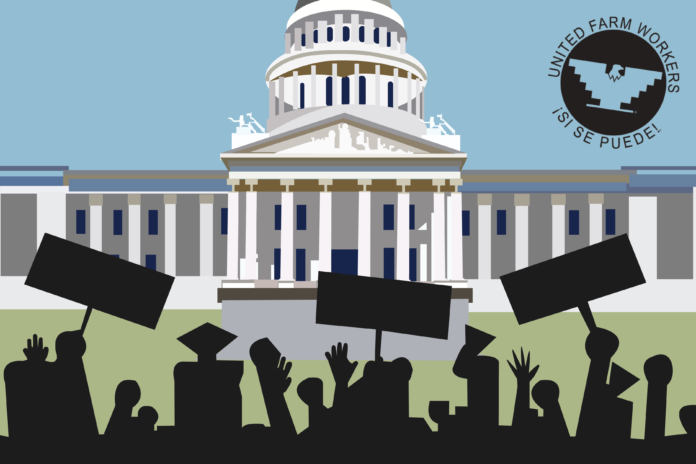UC Davis medical students show support for UWF farm workers’ efforts to pass assembly bill 2183
By CHRIS PONCE — city@theaggie.org
On Sept. 28, Governor Gavin Newsom signed AB 2183 into law — a bill that has long been lobbied for by the United Farm Workers (UFW). According to the UFW, the bill aims to help protect union elections from intimidation and prevent voter suppression. In August, UFW representatives marched from Delano, CA to the steps of the capitol in Sacramento — the same route Cesar Chavez traveled during his march with UFW in 1966 — to raise awareness about the bill and apply pressure on Gavin Newsom to sign it. UFW explained why they held the march in a statement on their website.
“California farm workers are staging a sacrificial 24-day, 335-mile peregrinacion (pilgrimage or march) from Delano to Sacramento during the heat of summer to convince Governor Gavin Newsom to sign their bill giving farm workers protection from intimidation in elections to choose a union,” the statement reads.
Second-year medical student Ferheen Abbasi first heard about the UFW’s trek when one of her friends asked if UC Davis was doing anything to support the marchers. Abbasi reached out to the marchers, asking if there was any way for medical students to help their cause. Abbasi was then put in contact with Andres Chavez, who is the organizer and Director of Strategic Initiatives at the Cesar Chavez Foundation and also the grandson of Cesar Chavez. Chavez and other marchers who she spoke to told Abbasi that they were in need of first aid and foot care.
Once she got in contact with marchers, Abbasi explained how she and her classmate Alejandro Alvarez took action.
“I emailed my classmates asking if anyone wanted to help and just had a ton of students saying yes,” Abbasi said. “I think that at the end, over 30 students came out to help because everyone was just very passionate and wanted to do something that impacted our community members.”
Abbasi and her peers tended to footbaths and epsom salt baths, gave massages and performed blister care. Doctors, some of whom were affiliated with UC Davis, also came to aid marchers and provided care for the more serious blisters, according to Abbasi.
Abbasi said that marchers expressed their gratitude for the coalition of students who came together to help.
“They were so incredibly overjoyed to see us just wanting to do something to help them and support them,” Abbasi said. “One of the marchers said how happy she was to see medical students wanting to help, and also [to see] so many people of color, but also not [just] people of color, everyone. We had my white classmates and again other people of color wanting to be allies to this, and that is what she was so moved by.”
Getting AB 2183 passed was no easy feat for UFW. The bill was signed just two days before its deadline, and activists’ concerns about the bill’s future were further increased due to Governor Newsom vetoing an earlier version of the bill last year. Organizers expressed concerns about the possibility of another veto, and Abbasi said that she was not sure that Newsom would budge.
“He has friends in these businesses that use — I’m going to be explicit — who exploit these farmworkers,” Abbasi said. “It is in their best interest to not pass this because they lose money, right? There’s a lot of capitalism involved, and honestly, I would even argue racism.”
Abbasi also expressed her concern about the lack of attention given to the UFW’s efforts. She talked about how vital it is for all people, but specifically medical students, who will be future doctors, to be aware of ongoing social struggles.
“These are our community members,” Abbasi said. “These are the people, for me, as a future physician — these are going to be my future patients. If I don’t know what they are going through now as a medical student, how can I best treat them in the future as a doctor? So I need to make sure that I am fully aware of what is happening in my own community before I become a doctor. I want to make sure I get to know them and their stories and that I am as inclusive as possible to whatever they are struggling with.”
Written by: Chris Ponce — city@theaggie.org




